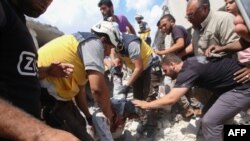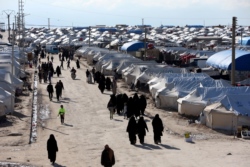The United Nations says conditions in Syria continue to deteriorate and humanitarian needs for millions of civilians remain acute across the war-torn country.
Senior Humanitarian Advisor for U.N. Special Envoy for Syria Najat Rochdi's job is to keep tabs on the humanitarian situation in Syria. She said conditions in this country, which has been at war for more than eight year, are alarming. She is appealing to the international community to protect and support millions of vulnerable civilians who lack the bare essentials for survival.
She said an estimated 11.7 million people need humanitarian aid and five million are in acute need. She said it has been a particularly grave month for civilians caught up in intensified fighting between Government and rebel forces in Idlib in northwestern Syria.
Her spokeswoman, Jenifer Fenton, said at least 350 civilians reportedly have been killed and more than 330,000 have been displaced. She said some three million people are at particular risk. She said they are trapped in the battle zone and are at the mercy of the warring parties as there is no place where they can flee.
"Civilian infrastructure continues to be damaged and destroyed. Protection of civilians remains our foremost concern. Far too many civilians are dying. Fighting terrorism does not absolve any party of its obligations under international humanitarian law and we continue to call on parties to uphold their agreements and to stabilize the situation," said the spokeswoman.
Fenton said the situation remains unsustainable for some 70,000 people living in the squalid, overcrowded Al Hol camp in northeastern Syria. These people fled to Al Hol after the Syrian government seized control of Deir-Ez-Zour, the radical Islamic State group's last stronghold.
The vast majority of the camp population is comprised of Syrian and Iraqi women and children. This population includes more than 11,000 family members of suspected IS foreign fighters from dozens of countries. These nations are reluctant to bring back their nationals fearing prosecutions of IS fighters will be difficult and will alienate their citizens.
UNICEF and other agencies are urging nations to repatriate an estimated 29,000 children of foreign IS fighters, noting they are blameless and are victims of this brutal war.
The U.N. Office for the Coordination of Humanitarian Affairs reports a number of children have been repatriated to their countries of origin in past weeks. But it adds thousands of others remain in Al Hol, facing an uncertain future.





